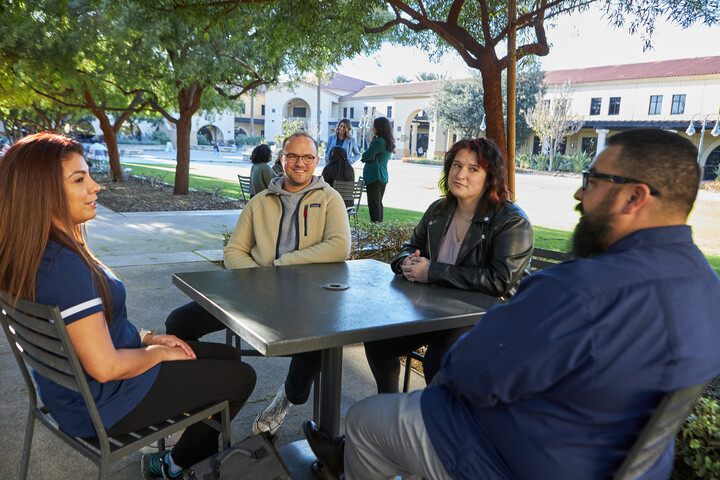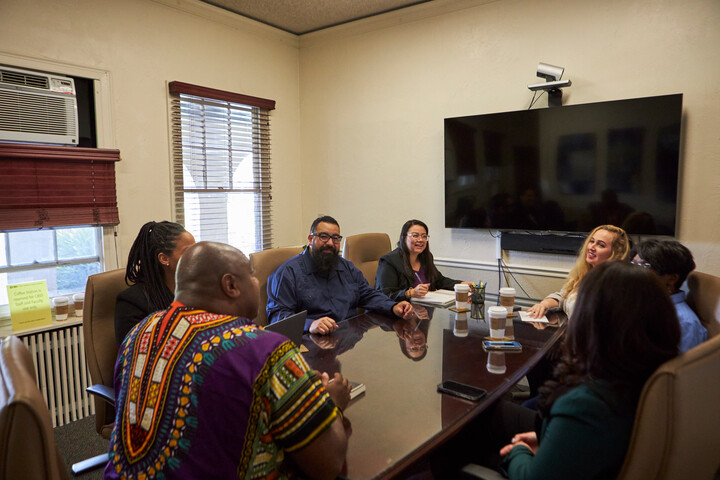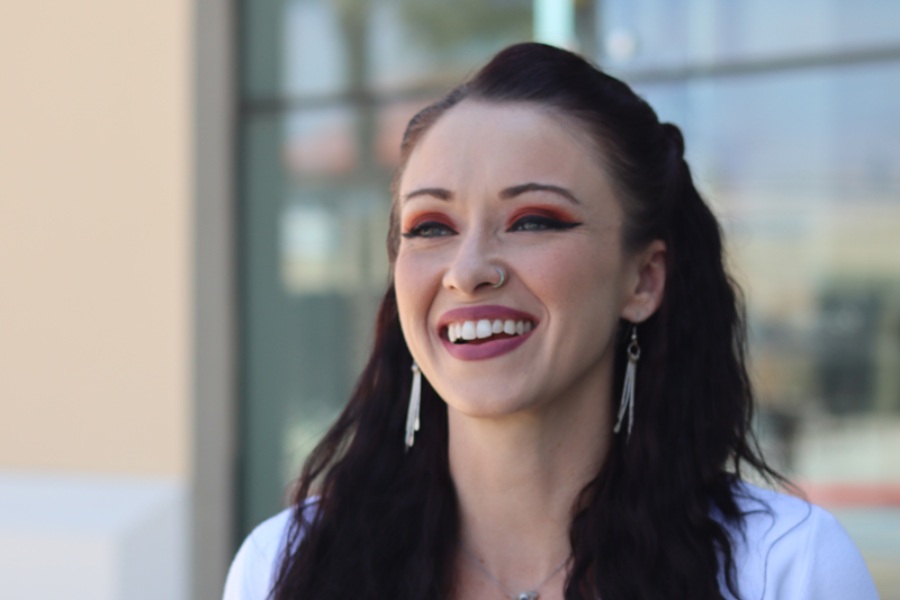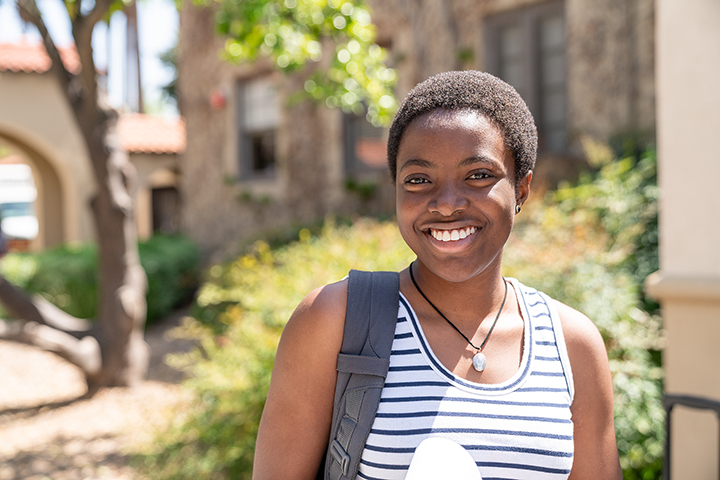
Social Work, MSW
Be an agent of change in your community by earning your MSW degree online or in person from California Baptist University. Acquire strong interpersonal skills and a rich understanding of social work history and best practices to make a lasting impact on those around you.
Build a Stronger Community Through Evidence-Based Practice
As a professional social worker, you are committed to enhancing human well-being and helping those in need, especially vulnerable, marginalized populations. The Master of Social Work degree program at California Baptist University offers evidence-based training, advanced professional development and transformative hands-on learning experiences that empower you to serve communities both locally and globally.
*1 year for advanced standing students
*500 field work hours for advanced standing students
Why Earn Your Master of Social Work at CBU?
CBU’s MSW degree program empowers you with the necessary training, hands-on experience and mentorship you need to champion social change, equity and well-being for all.
Receive Personalized Mentorship: Mentorship is a hallmark feature of our MSW program. Upon enrollment, we assign you a faculty mentor who models social work values, professionalism and the Christian faith. They help you navigate your academic journey and play a pivotal role in creating relationships with professionals in the human services field.
Put Your Skills Into Practice During Field Work: To instill strong community connections and community service, the MSW degree requires you to complete 900 hours of field work serving marginalized populations throughout the Inland Empire, including school districts, foster care agencies and inmate services. From helping with Riverside County’s Adoption Day to collecting and delivering coats for vulnerable children to serving as table facilitators at the Mayor’s Faith Summit, as an MSW student, you gain valuable experience helping your community. An MSW student must also obtain 16 hours a year of professional development to enhance networking skills and meet social work professionals from various fields.
Conduct Influential Research: The MSW program is committed to producing relevant and significant social work research aimed at enhancing the field. For your research projects, you are encouraged to partner with community organizations (such as nonprofits and social service agencies) to produce needed research to aid in analyzing data, raising funds, identifying and addressing service gaps and directing new community programming.
Apply for Advanced Standing: If you have earned a BSW degree from a CSWE-accredited university, you may be eligible to apply for Advanced Standing into CBU’s MSW program. If admitted, you can complete your MSW in 30 units and only need to complete 500 field work hours. For more information, review the Advanced Standing MSW application requirements.
Integrate Faith With Social Work: Our master’s in social work program empowers you to grow in your faith as you work to enhance the well-being of individuals, families and communities in need. In so doing, we follow the command of Jesus in Matthew 25:35–40. During your time in the program, you keep a faith journey journal to reflect on the interaction of your faith and the field and to privately share your thoughts and dialogue with your faculty mentor.
What You'll Learn
To equip you for your continued social work practice, learn about:
- The history, ethics and theory of the profession.
- Fostering professional relationships and strengthening interpersonal skills to connect with clients from diverse backgrounds.
- Multidisciplinary approaches to understanding human behavior and development and its application to social work practice.
- Case management, including client engagement, assessment, intervention, advocacy, evaluation and termination.
- Working with marginalized populations and economic, physical and environmental aspects that create marginalization.
- Methods of social research, including qualitative and quantitative methods, ethics and effective ways to put research findings into practice.
- History and philosophy of U.S. welfare policy and its impacts on marginalized groups.
- Approaching mental health and psychopathology from a social work perspective.
- Effective administrative and leadership strategies for managing organizations and delivering assistance to underserved populations.
Program Details
As a CSWE-accredited program, CBU’s MSW degree learning outcomes include:
- Ethical and professional behavior
- Engage in diversity and difference
- Advancing human rights
- Engage in practice-informed research and research-informed practice
- Policy practice
- Engage, assess and evaluate practice with individuals, families, groups, organizations and communities
- Intervene with individuals, families, groups, organizations and communities
- Faith integration
Designed as a two-year program, the Master of Social Work is 60 units consisting of:
- Eight foundation courses
- Five generalist requirements
- Nine electives
- Four practicum requirements
CBU’s Advanced Standing MSW program is 30 units, allowing qualified students to complete their graduate degree in as little as one year.
In-Person MSW
The traditional Master of Social Work program facilitates in-person learning experiences, where you attend classes on campus, allowing you to forge fulfilling working relationships with peers and professors and experience the fullness of CBU’s campus life.
Online MSW
Our online MSW program upholds the same standard of quality and excellence as our traditional MSW track while offering more flexibility and accommodations for students who are working, balancing family life or have a harder time getting to campus.
In the online master’s in social work track, you receive the same training, faculty mentorship and hands-on experiences; however, you progress through the coursework remotely and asynchronously. You also are required to complete 900 hours of field work.
The Master of Social Work (MSW) program at California Baptist University is accredited by the Council on Social Work Education.

SWK 515: Human Behavior and the Social Environment II
This course presents and critiques theories of human behavior as they relate to mezzo and macro systems, such as family, groups, organizations and communities.
SWK 530: Marginalized Populations
This course addresses what it means to be marginalized and presents information on the history and current status of various vulnerable populations domestically and globally.
SWK 574: Social Work with Survivors of Human Trafficking
This course provides an in-depth look at human trafficking and other forms of modern-day slavery in the United States and around the world.

Liza Arellano, DSW
Assistant Professor of Social Work
Master of Social Work (MSW) Program Director
Division of Social Work Accreditation Coordinator
Office Phone: 951-552-8409
E-mail: larellano@calbaptist.edu
Office Location: James 140

Kendra Flores-Carter, D.S.W.
Associate Professor of Social Work
Co-Director, Center for Community Engagement and Social Innovation (CESI)
Co-Chair, Global Engagement Committee
Office Phone: 951-552-8198
E-mail: kflores@calbaptist.edu
Office Location: James Complex Room 271

Lizbeth Gaona, Ph.D.
Associate Professor of Social Work
Office Phone: 951-343-4440
E-mail: lgaona@calbaptist.edu
Office Location: James 286

Krystal Hays, PhD
Associate Professor of Social Work
Program Director, Doctor of Social Work
Office Phone: 951-552-8145
E-mail: khays@calbaptist.edu
Office Location: James 132

Viola Lindsey, PhD
Professor of Social Work
Office Phone: 951-552-8958
E-mail: vlindsey@calbaptist.edu
Office Location: James , Room 274

Antonio Mejico Jr., Ed.D.
Associate Professor of Social Work
Associate Dean of the Division of Social Work and Associate Dean for Academic Services
Office Phone: 951-552-8949
E-mail: amejico@calbaptist.edu
Office Location: James 114
Applicants interested in CBU’s MSW program must submit the following application materials:
- California Baptist University application (including a nonrefundable $45 application fee).
- Official transcripts from all colleges and universities attended.
- Prerequisites (earning a C or better):
- Statistics
- A personal essay of three to four pages.
Application requirements differ for the standard MSW degree and the Advanced Standing MSW program.

Student Opportunities: Put Your Skills Into Practice During Field Work
To instill strong community connections and community service, the MSW degree requires you to complete 900 hours of field work serving marginalized populations throughout the Inland Empire, including school districts, foster care agencies and inmate services. From helping with Riverside County’s Adoption Day to collecting and delivering coats for vulnerable children to serving as table facilitators at the Mayor’s Faith Summit, as an MSW student, you gain valuable experience helping your community.

Student Opportunities: Receive Personalized Mentorship
Mentorship is a hallmark feature of our MSW program. Upon enrollment, we assign you a faculty mentor who models social work values, professionalism and the Christian faith. They help you navigate your academic journey and play a pivotal role in creating relationships with professionals in the human services field.

Student Opportunities: Conduct Influential Research
The MSW program is committed to producing relevant and significant social work research aimed at enhancing the field. In your social work courses, you are encouraged to partner with community organizations (such as nonprofits and social service agencies) to produce needed research to aid in analyzing data, raising funds, identifying and addressing service gaps and directing new community programming.
Careers for MSW Graduates
Currently, the demand for social workers exceeds the supply. The U.S. Bureau of Labor Statistics estimates the employment of social workers to increase annually by 7 percent over the next decade. This translates to about 67,300 job openings each year.
Regarding salary, graduates from CBU’s Master of Social Work program report a projected entry-level salary of up to $89,000, according to MSW exit survey data. Several factors influence social workers’ salaries, including the state of employment, education and experience and the type of facility in which they work.
Although earning a graduate degree is not required to be a practicing social worker, an MSW gives you a competitive edge, increases your earning potential and enhances the quality of your social work practice.
Related Programs
Learn More About CBU’s Master of Social Work Degree Program
Earn your Master of Social Work (MSW) degree on-campus or online at California Baptist University to transform the lives of individuals and families in your community. To take the next step and pursue your calling, request more information or apply today!




